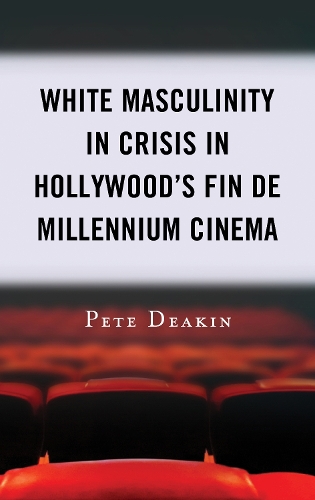
White Masculinity in Crisis in Hollywoods Fin de Millennium Cinema
(Hardback)
Publishing Details
White Masculinity in Crisis in Hollywoods Fin de Millennium Cinema
By (Author) Pete Deakin
Bloomsbury Publishing PLC
Lexington Books
15th October 2019
United States
Classifications
Professional and Scholarly
Non Fiction
Media studies
791.4365211
Physical Properties
Hardback
200
Width 160mm, Height 227mm, Spine 21mm
485g
Description
White Masculinity in Crisis in Hollywoods Fin de Millennium Cinema claims that Hollywood cinema had a significant relationship with the millennial crisis of masculinity, as the films of the fin de millennium movement reflected the wider cultural discourse of concern over the crisis of masculinity. Pete Deakin proposes that a dichotomous structure of either feminine or, preferably, hyper-masculine representations of male identity were predominant in films during this movement. Deakin investigates both sides of representation and places them in a broader matrix of American socio-cultural history and commentary by examining a variety of films from this era and questioning the motivation for reiterating the cultural and critical voices that asserted the apocalypse of white masculinity was underway. Scholars of film studies, media studies, gender studies, history, and sociology will find this book particularly useful.
Reviews
Film historians recognize 1999 as an exceptional year in American cinema. Deakin (Univ. of Salford) argues that 1999 was also the year in which contemporary anxiety over American masculinity exploded on the screen. Deakin takes 25 American films made from early 1999 to mid 2000 and discusses how they contributed to the dialogue about masculinity. The main focus is on Fight Club, American Beauty, American Psycho, The Matrix, and Office Space. Deakin explores how this body of film interacted with popular nonfiction of the era, e.g., Susan Faludi's Stiffed (1999) and Robert Bly's Iron John (1990).He describes the films as "fin de millennium white masculinity-in-crisis cinema" and argues that they capitalize on contemporary anxiety, "mourning the death of the so-called 'traditional' masculine figure" while still trying to sell a product--the masculine figure of the film and its ancillary materials (p.119). The men in these films are aesthetes and anti-capitalists, yet they need money and material possessions to reclaim their supposed natural manhood. Deakin delivers a fascinating. . . analysis. Perhaps the best critique is that of American Psycho, which problematizes the relationship between American manhood and consumer culture at its extreme. Summing Up: Highly recommended. Upper-division undergraduates through faculty.
-- "Choice Reviews"Author Bio
Pete Deakin is lecturer of film studies at the University of Salford.
